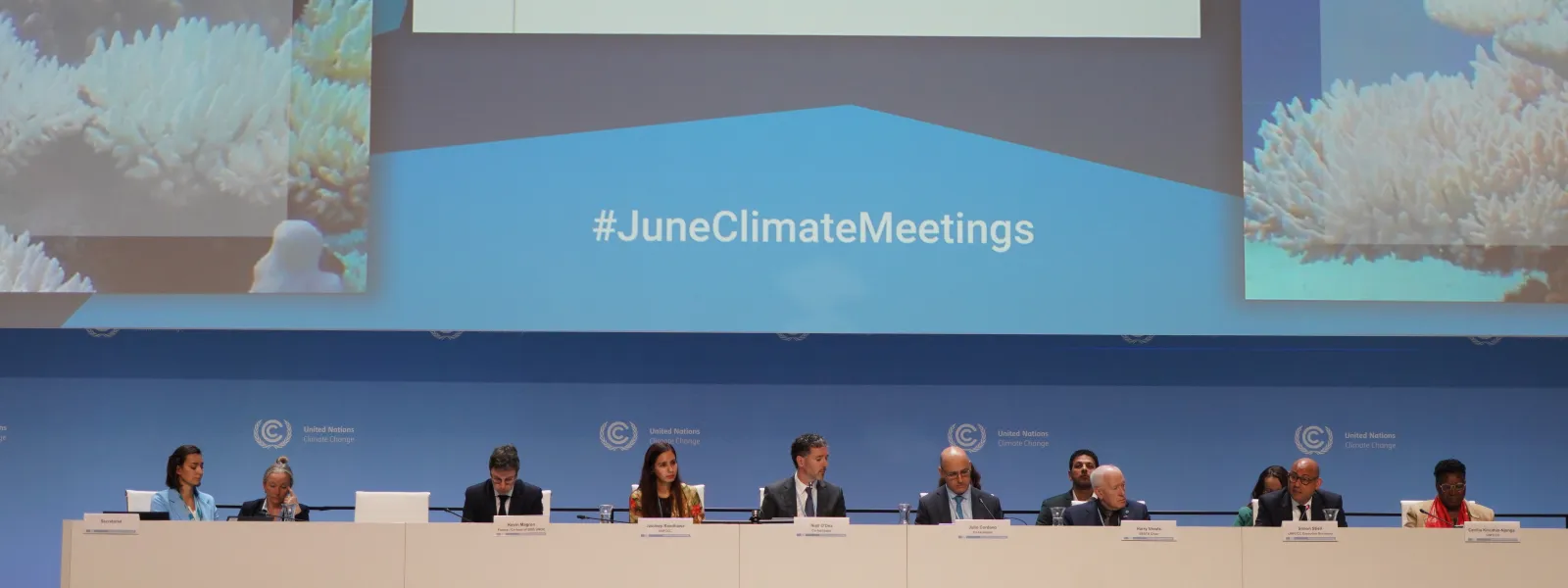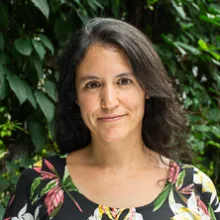
Climate negotiations: Reflections after the Bonn meeting ahead of COP29
Photo: UN Climate Change.By Florencia Ortúzar and Javier Dávalos*
The 60th session of the UN Subsidiary Bodies on Climate Change (SB60) was held in Bonn, Germany, from June 3-13, 2024.
These sessions, held twice a year, consist of technical meetings at which government delegates advance the agenda for international climate negotiations.
The Bonn session was part of the preparations for the twenty-ninth United Nations Climate Change Conference (COP29) to be held in Baku, Azerbaijan, in November, and was guided by the agreements reached at COP28, held last year in Dubai, United Arab Emirates.
AIDA participated in SB60 to bring the voice of Latin America to the negotiations from a human rights and gender perspective.
The following are reflections on the four main issues addressed at the meeting: just transition, global accounting, the new financing target, and the Loss and Damage Fund.
Work Programme on Just Transition
On June 2 and 3, the long-awaited first dialogue took place on the Just Transition Work Programme, which was created at COP27 to address the challenges of the transition to low-carbon economies and societies. The goal is to achieve an equitable and inclusive process that promotes the protection of workers and affected communities.
Civil society observer organizations noted that the principles of a just transition require an assessment of the impact of climate action on all human rights - including labor, social, economic and environmental rights - in key areas. To this end, decision-making in the work programme must include social dialogue and multiple levels of consultation with groups and communities.
AIDA advocated for the justice dimension to consider the differentiated impacts of the transition in different areas of the planet, particularly in the Global South, where the extraction of transition minerals (lithium, cobalt and copper, among others) threatens fragile ecosystems, species and vulnerable communities.
The problems of fossil fuel extraction are being repeated. Safeguards, participatory approaches and international cooperation are therefore relevant. It is also important to support economic diversification approaches that protect us from a new dependence on the sale of raw materials and encourage the search for new sources of income.
Follow-up to the Global Stocktake Dialogue
The Global Stocktake is a collective assessment mechanism to review global progress on climate mitigation, adaptation and finance every five years. The exercise will allow us to know whether global efforts are sufficient to meet the goals of the Paris Agreement to limit the global temperature rise to below 2°C, and hopefully 1.5°C.
The results of the stocktaking should have a direct impact on countries' climate commitments contained in their Nationally Determined Contributions (NDCs). The text of the first stocktaking, adopted in 2023, gave way to the process of updating the NDCs, which countries must submit in 2025 and which must reinforce the historic commitment made at COP28 to phase out fossil fuels, set specific targets to reduce methane emissions, triple renewable energy, and double energy efficiency.
The updated NDCs must include clear adaptation measures based on the conservation of biodiversity and key ecosystems such as the Amazon, wetlands and oceans. AIDA will monitor and follow up to ensure that countries in the region make progressive climate commitments that are consistent with what was agreed in the Global Stocktake.
The new collective quantified goal on climate finance
In 2009, developed countries agreed to mobilize $100 billion per year by 2020 to support climate action in developing countries. Then, in 2015, when the Paris Agreement was signed, it was agreed to set a new collective quantified goal on climate finance (NCQG). This target should be adopted in November, during COP29, and the Bonn meeting should pave the way for it. In addition, the new target will be an indicator of developing countries' ability to meet their updated NDCs, as well as a sign of fairness that could strengthen the credibility of the climate negotiation system.
However, reaching an agreement has not been easy due to the number of decisions needed to outline the new target in its entirety. The most difficult point to agree on is the amount that developed countries will have to commit to. So far, they have only agreed that it should exceed US$100 billion.
The Latin American countries, for their part, have not been able to propose figures based on the needs of the region. The list of countries that will contribute to the target is also still under discussion. According to the developed countries, some countries at an advanced stage of development could begin to contribute. There is also debate over whether the new target should also be used to finance loss and damage compensation, an issue that was not considered when the previous target was discussed and for which there is now a special fund. Another challenge for developing countries is that the financing resulting from the new target should not increase public debt. There are other details that still require agreement.
The COP co-chairs must now propose a document that reconciles divergent visions and serves to reach agreement at COP29. Countries can apply the lessons learned from the first target and secure a new target that is more effective in terms of quantity and implementation. Financing climate action is neither a handout nor a charity, but a duty and responsibility of developed countries. It is also in their interest: the effects of the climate crisis are global. Without a goal, there are no financial flows, and without financing, there is no way to address the crisis.
Launching the loss and damage fund
The Loss and Damage Fund was established in 2022 at COP27, and its operationalization was agreed a year later at COP28. While the creation of the fund is welcome, it is only a first step in making it the channel of support so desperately needed by countries already suffering the worst impacts of the climate crisis.
There are many challenges ahead. The Bonn meeting confirmed that the World Bank will be the interim administrator of the fund for the first four years. For civil society and developing countries in general, loss and damage must be recognized as the third pillar of climate action, alongside mitigation and adaptation. However, some developed countries seem to be suggesting that with the creation of the fund, it would no longer be necessary to include the issue as part of the new collective quantified climate finance goal, which does not make sense. Moreover, the amount that developed countries have pledged to the fund so far is less than 0.2% of what is needed annually. There is still no strategy that proposes how much contributing countries should contribute according to their responsibilities and capacities.
The fund must be decentralized and involve civil society, indigenous communities, youth, women and other vulnerable groups from the outset to ensure that the money reaches those who need it. It must also be efficient and sufficient, providing financial and quality assistance as quickly as possible. On the other hand, developing countries, including those in Latin America and the Caribbean, must make efforts to monitor and report losses and damage in their territories, which often poses economic, technical and even methodological challenges that require support, training and guidance.
The results of international climate negotiations are slow and the process often frustrating. The attitude of many industrialized countries, which shirk their responsibilities while enjoying development at the expense of the global climate balance, is disappointing. However, in the face of such a scenario, lowering our guard is not an option.
The organized civil society working around these negotiations is a cause for hope. It is a demonstration of solidarity and competence that achieves results and does not give up. By being there, representing our region, we are contributing to this movement with the wisdom and strength that comes from the Global South.
*Florencia Ortúzar is a senior attorney with AIDA y Javier Dávalos is the Director of AIDA's Climate Program.
Florencia Ortúzar Greene

Florencia is the Director of AIDA's Climate Program, and Coordinator of the Climate Finance Area, working from Santiago, Chile. She obtained her Law degree from the Pontificia Universidad Católica de Chile and also completed an MSc in Environmental Politics and Regulation at the London School of Economics (LSE) in England. She joined our team in 2012 and collaborates with Climate and Ecosystem programs. She enjoys spending time with her pets as well as cooking, camping and nature trekking.
